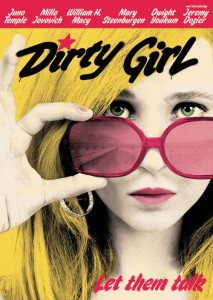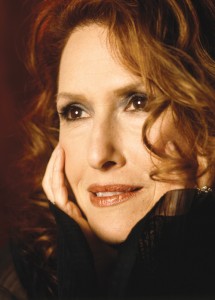It Looks Like Sunny Skies

From ‘Come in from the Rain’ to ‘Rainbird,’ the marvelous Melissa Manchester reflects on 40 years of making music
by Nancy Ford • photo by Randee St. Nicholas
She’s not really a back-row kind of performer.
Initially known as one of the original “Harlettes”—Bette Midler’s bawdy, all-girl backup singers—Melissa Manchester broke out of one of the most luminous chorus lines of all time to establish her own career. Almost immediately, the composer, pianist, and classically trained harpsichordist began racking up easy-listening ’70s and ’80s hits alongside contemporaries like Midler, Carol Bayer Sager, Barry Manilow, Peter Allen, and other late-20th-century musical giants. In addition to their irresistible melodies, her strong messages of empowerment (“Home to Myself,” “Come in from the Rain,” “Through the Eyes of Love,” and others) inspired not only a generation of young feminists-in-training but also gay men newly seeking their own special identity.
Though her chart-topping dominance peaked in the ’80s with her Grammy-winning song, “You Should Hear How She Talks About You,” Manchester has remained a formidable staple in the music business by penning soundtracks and original songs for “Lady and the Tramp II” and various television and stage projects.

More recently, Manchester’s music is the vehicle that transports the bullied gay protagonist of 2011’s Dirty Girl, for which she also penned an original tune with her friend Mary Steenburgen, who co-starred in the film. “I had no idea she was going to be in it until I read it, and there she was,” Manchester says. “The movie not only had nine of my songs in it, but it required an original song. We begged and pleaded for [director Abe Sylvia] to let us write it, and he did.”
In addition to these decades-spanning accolades, Manchester is perhaps best known for her signature collaboration with Peter Allen, upon whose life the Broadway smash musical The Boy from Oz was based. “I was delighted that ‘Don’t Cry Out Loud’ [one of Manchester’s chart-topping hits, written by Allen] was acknowledged and my friend was depicted so stunningly by Hugh Jackman. He was a remarkable character who died way too young.”
Her ongoing commitment to the community that has recognized her unique voice for decades is evident. In 2008 she digitally released “The Power of Ribbons,” a new single benefiting breast-cancer research, and last year she performed with the Gay Men’s Chorus of Los Angeles supporting the “It Gets Better” anti-bullying campaign. “I sing ‘A Mother’s Prayer,’ about bullying and all these teens who have committed suicide, to encourage people to hang on—that it does get better,” she says.
Playlist: The Very Best of Melissa Manchester, a 14-selection collection of Manchester’s memorable songs, is currently available from Arista/Legacy. Prior to its release, Manchester chatted with OutSmart about her 40-year musical legacy, drinking tequila in Houston, and why she was puzzled when this year’s Oscar nominations were revealed.
Hello, Melissa! I’m so honored to speak with you. When I first came out in 1977, your songs were high high high on my list of make-out background music with my first girlfriend. So thank you so much!
[Laughing] Aw, anything I can do for a good time!
I see you’re coming to Austin in March, but not to Houston.
Don’t take it personally! I don’t book these things, I just show up.
I love Houston. I learned how to drink tequila in Houston, at a wonderful saloon called Theodore’s. It was a bar/antique store, and the more loaded you got, the more you would buy things off the wall. It was fantastic.
How smart of Theodore! I’m glad Houston could reciprocally offer you that good time. [She laughs hard] And happy birthday. [She turned 61 in February.] What’s the best thing about being in your 60s now?
Thank you very much. Oh boy, that’s such a great question. What I see is, that the older you get, the more the nonsense burns away—the nonsense that is fueled by the energy of youth. You just really start to embrace discernment. You really understand what is important, what is the real currency of life—and that is memories. Making memories, having wonderful friends, amending, making whatever you need to make amends for, really. Holding your friends close and realizing that it does take a village to have a good life and raise kids and stay sane and all of those lovely things. You really, really notice that as you get deeper into your life. You know, you no longer have space for the toxic people in your life, because you are able to discern what is good for you.

That’s kind of a theme that runs through Dirty Girl, in terms of weeding out the chaff and seeing what’s true in your life. The film also focuses on bullying. Were you ever bullied as a child? Or as an adult, for that matter?
I was bullied a little bit, as a kid, but I had such a rich inner life. I was always just different. I was always daydreaming really hard. And I also had a very wonderful, creative family. My father was a musician, and my mother was one of the first designers on 7th Avenue. We just talked about stuff all the time. We didn’t really have to hide in corners, and there weren’t shadows, because we were such a lively group. I was raised with a gay, lesbian, and transgender crowd. They were our people!
Right! So there was nothing exotic to you about your upbringing, necessarily?
Well, we were exotic. We were “the others” but we didn’t know it. [Both laugh] We were all the black sheep of all the people we knew, but we seemed to be having the best time.
So anyway, about Dirty Girl. Abe Silvia wrote, as he calls it, this “vulgar Valentine,” that takes place in Norman, Oklahoma, in 1987. It dropped into my lap. I don’t get lots of scripts and this one was smart and funny and quirky. He wove nine of my songs into the story; my music and I appear to be the muse of the young lead boy who has nobody to talk to. It’s beautiful.
Beyond that music, who else do you listen to these days?
I listen to a lot of classical music. I listen to some jazz. And I still listen to Ella. And I listen to who my kids tell me to listen to. I don’t know the names of people, but they keep me aware of really good music that’s being created now. I also teach young songwriters now.
In a recent interview, you observed: “The thing that saddens me is that there’s a sense of entitlement among some women and groups of artists.” Can you expand on that?
Sure. I hate to start a sentence with “When I was growing up,” but unbeknownst to me, when Carol Sager [co-author of Manchester’s hits, “Come in from the Rain” and “Midnight Blue”] and I were first writing our songs, several were used to underscore films and specials for PBS about the beginning of the women’s movement. Not the very beginning, in the 1900s [both laugh], but in the 1970s. There was a clear sense of what was being fought for then: equal pay, maternal leave, sexual harassment—whatever, you name it, the whole thing. With accomplishments that have been achieved, you have the grit under your fingernails of the walk you’ve walked. And it’s wonderful that young women have endless possibilities at this point, it seems, to become whatever they want to become.
That said—well, this is sort of a complicated answer—but because of the usually two-working-parent family, there is less and less parenting going on. The unfortunate byproduct is, kids end up a bit needier. When they are needier, they feel entitled to kvetch and complain. And because we’re in an age of instant information and advertisements and stuff like that, all that leads to a sense of entitlement that life would be better if we had this thing that we see on television, or bought that stuff. And it just does a little bit of eroding. It just wears down the fabric of character.
I agree with you. In fact, I see a similar parallel with the gay community, with the struggles of our foremothers and forefathers who had to fight through Stonewall and everything. We hope the young gay couple walking in public, holding hands, is aware of how previous generations had to fight for them to be able to do that.
You bet, of course! And how ’bout that first wave of AIDS?
Yes, exactly. Anyway, getting a little lighter—
Yes!
Your wonderful hit “You Should Hear How She Talks about You” won a Grammy in 1982. Where do you keep that Grammy?
I keep it in my living room amidst photographs of wonderful people I’ve met along the way.
As you should! [She laughs] And there are only two songs nominated for an Oscar this year. What are your thoughts on that?
[Sadly] Yeah. Well, I’ll tell you what my thoughts on that are. [Sighs heavily] My song “Rainbird,” the original song from Dirty Girl, made the list of the 39 songs to be considered for Oscar nominations.
Congrats!
Well, thank you, but it was bittersweet when they only picked two [nominees]. I don’t know exactly what happened. I don’t know why only two songs from animated features are worthy, since the movie Dirty Girl used music throughout as a Greek chorus to help tell a story. I can’t imagine that any other movie would be that saturated, with their director understanding the importance of music. So I don’t know what happened. I feel like it’s nuts. [Chuckles slightly] I’m happy for my colleagues who were nominated, but I just think something is weird.
That struck me as very odd, too.
Very odd, yes.
Speaking of movies, For the Boys [1991] was on television the other night. Love that movie—
Aw, thanks!
One of my favorite moments in that film is when Bette Midler and you and some others are singing in the studio—
“Billy-A-Dick.”
Yes! When it comes to the line where you sing, “When’s that kid in the G.I. lid gonna choo-choo down the track?” you reach up and wipe the corner of your lipstick ever so subtly, but all the focus just goes Boom!—right there. Every time I watch that movie, it just tickles me for some reason. Was that move scripted or spontaneous?
[Laughs wildly] No, no, that just happened. Thank you very much. My little acting blip!
So, you’re a Grammy winner, you’ve acted in movies, written musicals, sung the National Anthem for a World Series game in 1991. What haven’t you done that you would like to do?
I’d really like to sing with Tony Bennett.
What a brilliant idea for a duet! What song would you like to sing with him?
I don’t know, but I would sing a grocery list with him.
No kidding. Or a phone book.
Really! Yes, I have lots of things that I
still want to do. Life is this unfolding adventure. It’s been a lovely journey. I don’t know why, but something shifted in me recently. Maybe it’s turning 60, almost 61, and realizing you don’t spend a lot of time looking back when you’re working. You just work at what’s at hand. But to realize that this has turned into a 40-year career is fantastic.
Melissa Manchester plays a one-night engagement at One World Theatre, 7701 Bee Cave Road, in Austin, on March 11. For details, log on to oneworldtheatre.org.











Comments